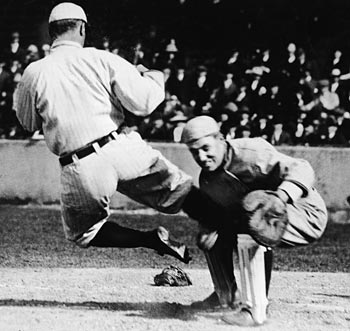 The faulty redemption theme, a staple of stupid press coverage on doping in American sport, began decades ago with media tales of contrition by athletes coming off steroid suspensions.
The faulty redemption theme, a staple of stupid press coverage on doping in American sport, began decades ago with media tales of contrition by athletes coming off steroid suspensions.
In the 1990s, for example, drug-tainted football players cried in familiar refrain when returning to the game: Waa. I used steroids and made a mistake. I’m sorry. From now on I do things the right way. Writers lapped up the PR slop, repeating dubious claims as factual.
Today the redemption storyline has escalated into heartwarming portrayals of drug reform for an entire sport, Major League Baseball, although writers still run the message through personal profiles of jocks.
Sportswriters increasingly tell us MLB is miraculously moving beyond its steroid era. In simplistic fashion, scribes cite declining power numbers as conclusive evidence. In ridiculous fashion, they choose and construct suspect Mr. Cleans from bulky power hitters, by extension implying baseball is somehow capable of reversing rampant use of steroids and growth hormone.
Redemption theme works as a fan-pleasing response to doping scandal in baseball, but the angle also backfires on media.
In 2005, with Mark McGwire branded as drug cheat, media briefly glorified Rafael Palmeiro as symbol of baseball goodness. Then he tested positive for steroids. In 2007, when steroid pariah Barry Bonds broke Hank Aaron’s career homerun record, sportswriters gravitated to Alex Rodriguez, anointing him as the game’s drug-free savoir.
Now, with A-Clod exposed as steroid liar, writers frame Mr. Clean stories around sluggers Albert Pujols of the Cardinals and Josh Hamilton of the Rangers. Pujols embraces the attention, promising media and fans they can “believe” in him.
But anti-doping technology is invalid and both Hamilton and Pujols are abnormally large specimens. More factors, personal histories, invite skepticism about each player. In sum, Hamilton and Pujols are among baseball’s last to uphold as role models within present-day context, or the wealth of public information on muscle substances, particularly in MLB, and the impossibility of proving abstinence by any individual.
Sportswriters should drop foolish redemption stories. They can wish away widespread use–and the reality that won’t change anytime soon–without trying to absolve any athlete or game.
Slugger tales of baseball can be produced without mentioning drugs. Most fans want the sanitized versions, anyway.

Click here to purchase Matt Chaney’s latest book
